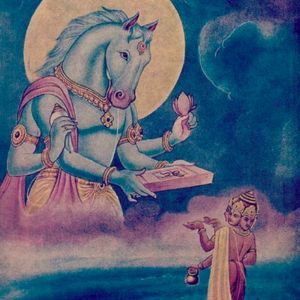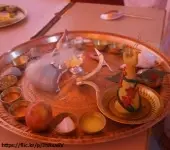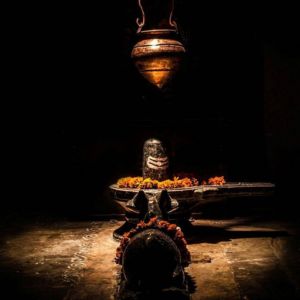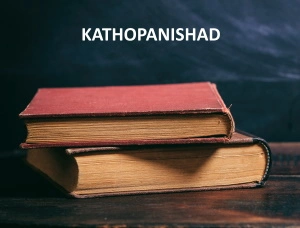Why Was Nachiketas Baffled?
Click above to listen only to audio.
Three meanings words
1.Abhidha - literal meaning. A stone means a piece of rock. 2.Lakshana - secondary meaning. The word stone can be used to indicate hardness. 3.Vyanjana - suggestive meaning. The word stone can be used to indicate the merciless nature of someone.
Abhasa
Abhasa means that the material world as it appears is not real. The physical world, senses, and the mind are unreal. They constitute abhasa. Brahman is the only truth.
Quiz
How many Runas ( debts ) are there?Transcript
(Click here to read more)
You must be familiar with the story of Nachiketas. Nachiketa's father was performing a yaga called Sarvavedasa in which everything is given away, except the kowpeena, one vessel made of clay for drinking water, one's own wife, and children. This is the very nature of this yaga, this complete giving away. So after giving away everything at the completion of the yaga, dakshina is to be offered, right? If proper dakshina is not offered at the completion of the yajna, it will be fruitless. हतयज्ञमदक्षिणम् Whatever was....
Transcript
(Click here)
You must be familiar with the story of Nachiketas.
Nachiketa's father was performing a yaga called Sarvavedasa
in which everything is given away, except the kowpeena, one vessel made of clay for drinking water, one's own wife, and children.
This is the very nature of this yaga, this complete giving away.
So after giving away everything at the completion of the yaga, dakshina is to be offered, right?
If proper dakshina is not offered at the completion of the yajna, it will be fruitless.
हतयज्ञमदक्षिणम्
Whatever was given away during the yajna can not be considered as dakshina.
It is like you are handing over 1,000 rupees to the teller at a bank to be sent to a friend.
But in addition to that, you have to give bank charges also right?
1,000 rupees is the transaction amount; bank charges are extra. 10 rupees 20 rupees or whatever.
So at the completion of the yajna, when dakshina was to be given, then there was nothing left.
What to do now the yajna will fail?
So Nachiketa's father decided to give away Nachiketa as the dakshina.
Nachiketa was a five or six-year-old boy.
He had earlier seen that healthy cows after being given water and grass were being given away during the yaga.
They were milked and then given.
One: to prove that they were milk-yielding and will not become a burden on the recipient.
Secondly, when the udder is full the cows are disturbed.
They are in a state similar to when you have the urge to attend to nature's call.
After they are milked, they become peaceful.
When giving godana, the cow has to be peaceful.
Then only it helps.
You can’t give a cow that is disturbed.
Nachiketa was watching all this.
He realized that so much attention was being paid to the intricacies.
But then suddenly this happened.
He saw that he was also being given away of course out of compulsion.
But Nachiketa was baffled.
In godana, there are two beneficieries.
The recipient of course gets to use the milk and milk products.
He can use them for divine purposes.
Here is another point.
It is not just divine purpose.
The cow produces so much milk that it has three parts.
One meant for divine use.
One meant for the calf and one meant for human consumption.
So one beneficialry is the recipient who also gets to enjoy the milk in addition to using it for divine purpose.
The second beneficiary is the giver.
On account of the merit of this dana, the giver also attains a punya loka.
Nachiketa is baffled because he couldn't make out how it is going to work in his case.
That's when he started asking his father again and again.
Whom are you going to give me to?
Who is the beneficiary, who is the recipient and how is he going to be benefited?
Nachiketa's father was in deep sorrow, that his forgetfulness about not keeping something separately for dakshina has forced him into separation from his beloved son.
He was sad and frustrated.
On top of that, the child is asking again and again.
He blurted out: मृत्यवे त्वा ददामि - I am giving you to death, Mrityu, Mrityudeva.
Nachiketa was even more confused now.
How am I going to be of use to Mrityu?
बहूनामेमि प्रथमो बहूनामेमि मध्यमः किं स्विद्यमस्य कर्त्तव्यं यन्मयाद्य करिष्यति
Becasue a lot many have gone to Mrityu before me; capable, talented, powerful, dexterous.
A lot many will go after me also.
I am in the middle.
What is it that they can not do that I will be able to do?
I am a young boy.
He was so baffled that he fainted there itself.
It is in this state that his antaratma visited Yamaloka.
His physical body was still there on earth.
Only his antaratma went to Yamaloka.
Recommended for you
Hayagriva Gayatri Mantra For Knowledge

ज्ञानानन्दाय विद्महे वागीश्वराय धीमहि । तन्नो हयग्रीवः....
Click here to know more..What to do with photos and idols if they are damaged
 Click here to know more..
Click here to know more..
Lingashtakam

ब्रह्ममुरारिसुरार्चितलिङ्गं निर्मलभासितशोभितलिङ्गम�....
Click here to know more..
English Topics
Kathopanishad
Click on any topic to open
- 13 What to Ask for if You Meet God
- 12 Nachiketas Responds To The Offer Of Yamaraja
- 11 Yamaraja Tries To Dissuade Nachiketas
- 10 Third Boon Of Nachiketas
- 9 How to attain absolute peace?
- 8 Extra Boon From Yamaraja To Nachiketas
- 7 Yamaraja Teaches Nachiketas About Swargya Agni
- 6 The Second Boon Of Nachiketas
- 5 The First Boon Of Nachiketas
- 4 Which Comes First, Night Or Day?
Please wait while the audio list loads..
30
Ganapathy
Shiva
Hanuman
Devi
Vishnu Sahasranama
Mahabharatam
Practical Wisdom
Yoga Vasishta
Vedas
Rituals
Rare Topics
Devi Mahatmyam
Glory of Venkatesha
Shani Mahatmya
Story of Sri Yantra
Rudram Explained
Atharva Sheersha
Sri Suktam
Kathopanishad
Ramayana
Mystique
Mantra Shastra
Bharat Matha
Bhagavatam
Astrology
Temples
Spiritual books
Purana Stories
Festivals
Sages and Saints

